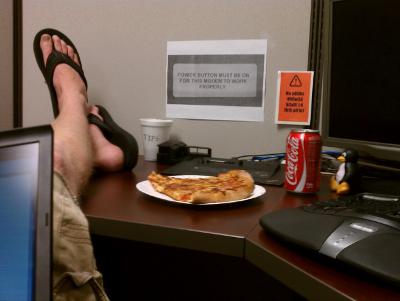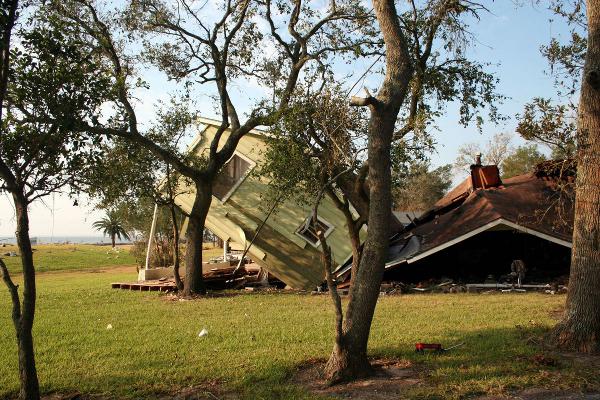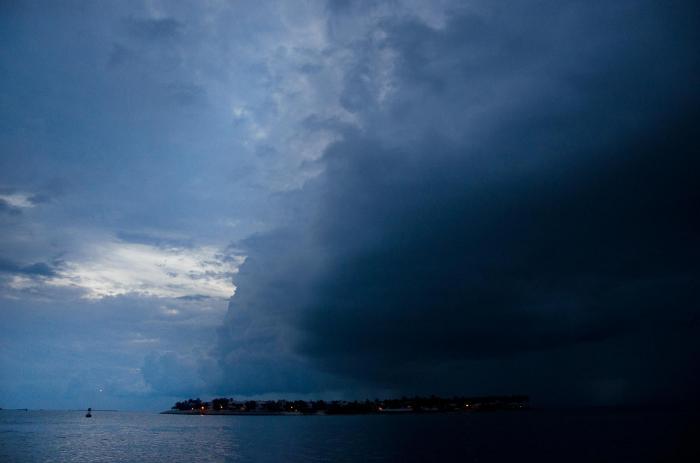A Pepper Grinder Post
Disaster Recovery
Last weekend I was at a disaster recovery drill. Don’t feel bad if you don’t know what that is—I had never heard of the things before I got into I.T. Here is how it worked. On Friday, 12 guys got into 3 S.U.V.s with a whole lot of backup tapes and CDs. We then drove about 5 hours and checked into a hotel near the disaster recovery facility. Friday night, most of the guys got together for a big meal and some beer. I don’t like the taste of beer, and I tend to feel miserable if I eat much in the evening, especially if it’s fatty, so I just hung out in my hotel room, had a couple of pieces of fruit, and posted last week’s Pepper Grinder post. Saturday morning we got up in time to have breakfast at 6:00 so we could get to the facility by 7:00.
 The disaster recovery facility is a big building off in the woods, run by a major tech company. We pay them lots of money so we can go there, hang out in a few rooms with lots of computers, and try to work the magic of getting all our company’s most critical computer systems up and running within 24 hours, using only the tapes and CDs we brought and the computer equipment supplied by the facility. There is plenty of waiting around, punctuated by times of intense activity. It is not a good time for sleeping. This time I got back to my hotel room about 3:30 AM, and I was supposed to be down in the lobby to go back to the facility at 5:30 AM. Believe it or not, that is better than the previous time I was at one of these drills, when I didn’t get back to the hotel room until after noon on Sunday! It is an exhausting experience, and being an introvert who doesn’t like to be away from his family and who almost always feels like the odd man out in groups doesn’t make it any better.
The disaster recovery facility is a big building off in the woods, run by a major tech company. We pay them lots of money so we can go there, hang out in a few rooms with lots of computers, and try to work the magic of getting all our company’s most critical computer systems up and running within 24 hours, using only the tapes and CDs we brought and the computer equipment supplied by the facility. There is plenty of waiting around, punctuated by times of intense activity. It is not a good time for sleeping. This time I got back to my hotel room about 3:30 AM, and I was supposed to be down in the lobby to go back to the facility at 5:30 AM. Believe it or not, that is better than the previous time I was at one of these drills, when I didn’t get back to the hotel room until after noon on Sunday! It is an exhausting experience, and being an introvert who doesn’t like to be away from his family and who almost always feels like the odd man out in groups doesn’t make it any better.
And yet, it is for a good cause. The idea is that if a hurricane or earthquake ever levels the corporate headquarters where I work, we would be able to get the company back up and running pretty soon and go back to killing chickens. (Did I ever mention that I work for a poultry company?) The theory is that having these drills regularly (we do this once or twice a year) will enable us quickly to recover from a disaster—hence the name, disaster recovery. The previous company I worked for (which happened to make tractors and farm equipment) did the same thing.
 I think it’s a good idea in theory, and I’m sure it makes us MORE prepared for a disaster, though I can’t help wondering what kind of unexpected problems we would run into in a real disaster.
I think it’s a good idea in theory, and I’m sure it makes us MORE prepared for a disaster, though I can’t help wondering what kind of unexpected problems we would run into in a real disaster.
All this led to me musing about what disaster recovery is for a Christian. The problem with disasters is that they’re so darned hard to predict. After the September 11 attacks, our government did all sorts of things to keep people from taking over planes and flying them into buildings. But I don’t think we did nearly as much to prevent people from derailing trains or sinking ships or even messing up the computer systems that control our electrical grid.
In the same way, it is very hard to predict what unexpected things might happen to us, though I certainly do try. My mother described herself as a worrier, and I definitely think I inherited some of her worrying genes. I will frequently imagine horrible things that might happen. I think I am doing it to protect myself. If I imagine my wife getting Alzheimer’s (or cancer or in a car accident, or …), I reason, then I’ll be a little more prepared if she does. The trouble is, I have doubts how much the blow would be softened if the thing I dread actually happened. Also, the exact thing I picture never happens. I am not sure I could have guessed ahead any of the best or worst things that have happened in my life. What it boils down to is that I spend lots of time and emotional energy imagining awful things that probably won’t ever happen. As you may have guessed, I think worrying is a lousy disaster recovery technique.
A technique employed by some is to try to prepare carefully for anything bad. These are the people who have a big generator (which they keep in excellent working order), ready to power up whenever the power goes out. They are the people who had months of food stockpiled as we drew near to the year 2000. In a way, I admire these people. However, I see two problems with this approach.
- There are some things from which you cannot protect yourself, no matter what you do. If a loved one dies of cancer, you can be protected financially if you have great health insurance and a healthy savings account. But there is nothing (at least nothing emotionally healthy) you can do to protect yourself from the emotional pain of losing that person.
- I do not believe that God wants us always to be self-reliant. Speaking for myself, at least, God seems to love to sneak past my defenses to pull me into situations where I will be forced to rely on him.
 So what can we do to prepare for disaster? David was a person in the Bible who saw plenty of what we could call disasters. He was driven from his home and forced to spend a long time fleeing from his king, who was trying to kill him. He and his men had their wives, children, and posessions stolen away from them, and his men were so bitter that they were talking about stoning him. Later in life, his own son tried to kill him and take over the throne. I certainly think those would count as disasters. And yet, here is what David said:
So what can we do to prepare for disaster? David was a person in the Bible who saw plenty of what we could call disasters. He was driven from his home and forced to spend a long time fleeing from his king, who was trying to kill him. He and his men had their wives, children, and posessions stolen away from them, and his men were so bitter that they were talking about stoning him. Later in life, his own son tried to kill him and take over the throne. I certainly think those would count as disasters. And yet, here is what David said:
Therefore let everyone who is godly pray to you while you may be found; surely when the mighty waters rise, they will not reach him. You are my hiding place; you will protect me from trouble and surround me with songs of deliverance. (Psalm 32:6-7, NIV)
I do not believe this is promising we will never experience trouble. That would not mesh with David’s own experience at all. Instead, the promise is that God will be our hiding place when trouble comes.
This promise is better than having a generator and a wood burning stove, or a building full of computers, pizza and I.T. guys.
- Pepper
Posted 2014-05-03
*Photo Credits: pizza, feet and computer from www.themarysue.com, houses damaged by hurricane by Photonut, storm clouds by Roger
